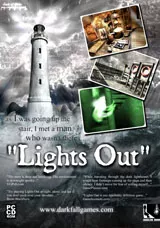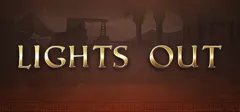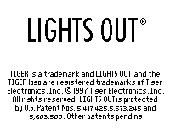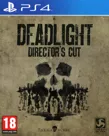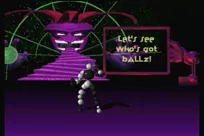Dark Fall: Lights Out (The Director's Cut Edition)
Description
The Director's Cut Edition of Lights Out contains new graphics and effects, new puzzles, more encounters with ghosts, an enhanced story and more sounds and music.
Groups +
Reviews
Critics
Average score: 60% (based on 1 ratings)
Players
Average score: 3.1 out of 5 (based on 6 ratings with 1 reviews)
The Good
Designer Jonathan Boakes’ has added a lot more atmosphere to most of the areas of the game: More frequent ghost whispers, a greater number of musical bursts. On the graphical side a large, eerie moon has been added to the Fetch Rock location in the 1912 era, improving the somewhat dreary outdoors environment there. A drunken fisherman now stands outside of the Fisherman’s Arms in Trewarthen, muttering words of dark omen, whilst the sound of breaking glasses and merriment issues from within the pub. Mist now rolls across the screen. The environments generally have been made far livelier and noisier. It should be noted however that by my reckoning very few sounds have actually been added to the game that were not in the original; they have just been made more frequent and more prominent.
Certain very minor errors or omissions have been corrected: where before your Trewarthen cottage was perfectly lit, despite there being no visible light source and it being dark outside now a lantern hangs upon the wall. A bucket of water is now available next to DeMarion’s outside latrine to wash your hands after you have finished rummaging inside of it for scraps of paper.
More significantly, certain story points have been clarified. A much clearer explanation of the nature of the spectral glow attributed to the various people possessed by Malakai is given; we now see the character of Magnus and all becomes clear. A lot of work has been done on this aspect of the game; quite a lot of changes have been made to the narrative to make piecing together the sequence of events an easier task (personally I thought it was fairly straight forward anyway). In fact the story has been simplified a fair bit.
The Bad
Too much for my tastes. The game is a far more linear affair now. Most of the extra detail has been excised from the narrative and most of the sources of information (journals etc) have been ‘tidied up’... basically had their content reduced. The adventure has changed a fair bit as a result.
Too many of the changes have been made without enough thought given to how they will affect the game as a whole. It is a testament to the cohesive, non-linear nature of the original game that changing the contents of the notebooks and other sources of story information even a small bit suddenly left huge logic gaps in the narrative. An example: Polly Walker’s notebooks have been severely altered in order to simplify the storyline. One of the consequences of this change is that her journal no longer talks about the different methods of communicating with ‘spirits’. In the original game, in order to get help from this character the player would have to communicate with her using these methods (a series of knocks: one for yes, two for no etc). Having done this and demonstrating to the character that they can be trusted she then agrees to help them and pushes a map under the door, showing the location of a very useful object. Now, with the clue to solving this puzzle removed from the journal, Boakes has as a consequence removed the puzzle from the game. Unfortunately, what he doesn’t seem to have considered is that this no longer gives the character of Polly Walker any reason whatsoever to announce “two minds are better than one” and to slide the map under the door, helping the player... but that is exactly what she still does. The entire sequence now makes no sense whatsoever.
In the same location a change has been made to the mannequins exhibit: whereas in the original game pressing the button below the display played out an hilarious, cheesy dialogue giving the erroneous historical account of the Fetch Rock disappearances that has falsely become accepted as fact in the modern world setting of the game, it now has a far less entertaining account of the real events. Personally this was one of my absolute favourite scenes in the first game; we have all seen those awful exhibits in museums and tourist attractions where two terrible actors voice awful, hackneyed dialogue to accompany the badly moving mannequins behind the glass case. The scene had me laughing out loud and really added authenticity to the location and the idea that it has now become a tourist attraction. Now the charm has been stripped out of it, as we now get the real historical dialogue between the two characters instead when the button is pressed. Not only is this infinitely less entertaining it is also illogical: why would this dialogue have been recorded for the exhibit when its designers believed a different story to be true? Besides which, these further elucidations are completely needless anyway; it is now extremely obvious from the very beginning of the game what has happened to the lighthouse keepers. There is no mystery. At every turn things have been simplified to spell out the storyline so that even the slowest player can follow the sequence of events. Unfortunately the whole game has this new approach. I really got the feeling that Boakes’ had decided that on second thoughts people were too stupid to understand his game and so he had to write everything in nice, big letters for them. At its worst I found this approach to be patronizing.
It isn’t just the story logic that sometimes suffers from the ill thought out changes; it is the game logic too. Having apparently decided (he explains in the game notes) that a certain puzzle in the Fetch Rock lighthouse was conceptually terrible and that he was ‘deeply sorry’ for it Boakes has therefore changed (simplified) it in this version. Whereas before the player had to find two separate scrolls and use symbolic information depicted upon both of them to work the lighthouse boiler now only one is needed (and it is now so simple as to barely even be a puzzle anymore). So he has removed the extraneous scroll from the game, right? Wrong. It is still there but now it is identical to the other one. Except that one is easy to find and one is hidden, as before, barely visible in the shadows. One can only wonder what a player playing Lights Out for the first time will make of the experience of excitedly discovering the hidden scroll only to find it to be completely identical to the one they already have and totally useless. There are various other examples of these kinds of clumsy changes.
Too many of the changes are judgement calls, changing elements of the game rather than supplementing them. The final, futuristic location now has one of its two entrances removed so that the player now has to explore it in a certain sequence, following the (again simplified) back story in a very linear fashion.
Of these judgement calls perhaps the biggest is that the player now sees and communicates with the ‘ghosts’ of the Fetch rock lighthouse during their initial investigation in 1912. Before, this was not possible until they had acquired a certain inventory item much later in the game. Whereas some may prefer this ‘noisier’ approach to the lighthouse I personally liked the eerie silence and the disconcerting mystery that greeted my exploration in the first game. There was a far greater suspense as the player wandered around the abandoned lighthouse, wondering just what had happened to the missing keepers, going through their things, trying to get a handle on the mystery, all the while with the feeling that something could happen any minute... in this new version it is simply a case of ‘turn up, go up the stairs, “oh, there they are. They’re ghosts now. Blake did this to them.” Mystery over’. The story loses all of its enigmatic properties. Does something overtly supernaturally have to be happening every step of the way or is it more effective to use such things more sparingly to heighten their impact, as in the original version? Besides which, nothing new is actually added by talking to the ghosts; no new information is discovered, no further back story. In fact, there isn’t even any new dialogue, since as I mentioned earlier no new speech has actually been added to the game; it has only been made more frequent (and sometimes clearer). The 'ghosts' now just repeat the same things they will say later in the game. In his notes Boakes states that he always wanted there to be more action in this location but he was unable to realize that originally due to time constraints. Personally, I feel that was a very lucky twist of Fate for him.
The Bottom Line
This is not a true Director’s Cut; such a thing equates somewhat with an ‘author’s preferred text’, whereas this is more of a reconsideration or reappraisal of the game. A few blanks are filled in from the original version of the game and a little atmosphere is added here and there. A few puzzles are changed for the better; a few for the worse. Beyond that there are a few non-minor changes to the storyline and a restructuring of the gameplay and narrative development to make it considerably more linear and straightforward. There are some good changes and just as many not so good changes. The not so good changes however were far more significant by my reckoning. This game should be approached more as an alternate version, a further iteration, rather than the definitive rendition of Dark Fall: Lights Out. I personally am pleased that there are still outlets selling the original.
Windows · by CBMan (184) · 2010
Analytics
Upgrade to MobyPro to view research rankings and price history! (when applicable)
Identifiers +
Contribute
Are you familiar with this game? Help document and preserve this entry in video game history! If your contribution is approved, you will earn points and be credited as a contributor.
Contributors to this Entry
Game added by PolloDiablo.
Game added December 23, 2009. Last modified May 20, 2024.


